I've always compared the front lower part of my vectrix with a parachute brake, a continuous loss of energy, an highly inefficient body shape. As Vectrix does not need any radiator, there's no point in building this electric bike following the shape of an innefficient oil burner.
After some googling for ideas, I've come across with a very interesting web-page about Aerodynamics and Electric Motorcycles.
http://www.schultzengineering.us/aero.htm:
The idea of an extra piece con convert my vectrix into a Dustbin faired bike came immediately to my mind! Is it really worth?
Let's have a look at this pictures:
With a dustbin fairing it could be possible that at 100 km/h the consumption is sliced by 30%. That increases our 35 km 100 km/h range to nearly 45 km 100 km/h... Anybody knows the real DC of our vectrix?
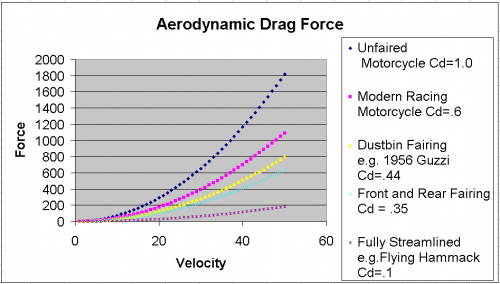
The front part of a streamlined body has the utmost importance to reduce DC...
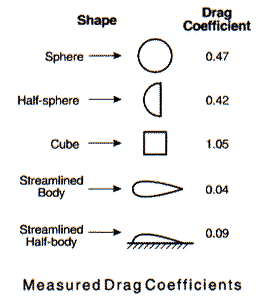
Many Bikes tried the dustbin fairing:
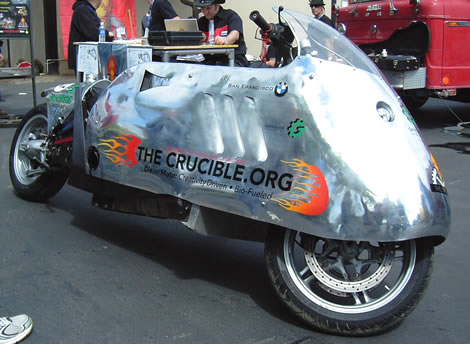
Some Electric bikes from the TTxGP Also adopted this efficient Shape:
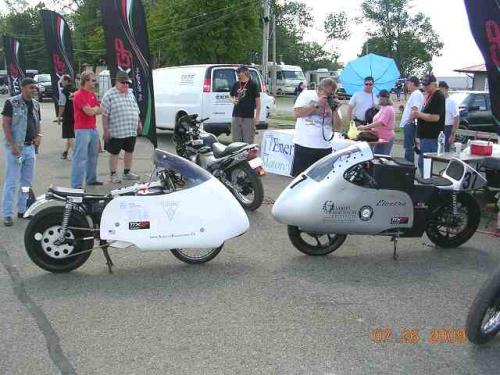
It's a pity that efficiency and beauty sometimes don't come together, but I'd prefer extended range rather than beauteousness...
A possible approach:
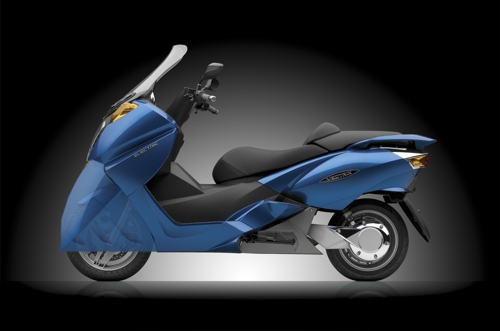
Will be ever see a special kit to improve vectrix aerodynamics?




While I know, it would improve aerodynamics considerably, I wouldn't want to look like a geek on a geek bike. If Vectrix wouldn't look as good as it does, I wouldn't have bought it ;-)
I don't dislike the idea. After all, this bike is for people that like technology! I think that is possible to combine design and performance. Italian designers have much practice on that...
Interesting concept. It strikes me that one could try out the effectiveness of this concept fairly easily with some sturdy plastic and some duct tape. By mocking it up without thought for the ability to turn one could compare the effect of this design to an umodified bike and find out it if it's even worth continuing to a practical version with steering. You'd need a straight road of course! ;-)
One of the things on my "to-do" list is to try modifying a C1x with one of these: Craig Vetter High Mileage Fairing.
Here's an image of the Vetter fairing overlayed on a Honda Helix:
Aerodynamics is definitely an under-utilized tool in the current 2-wheel EV world.
John H. Founder of Current Motor Company - opinions on this site belong to me; not to my employer
Remember: " 'lectric for local. diesel for distance" - JTH, Amp Bros || "No Gas.
How this proposed aerodynamic front will affect the airflow needed for cooling the batteries?
Has anyone noticed that in the World Superbikes Championship, all bikes dont seem to be very "aerodynamic orientated" and more "manouverability for the rider orientated". They hardly have windshields, all the air hits the rider, the wheels are "open air" etc.. etc..this maybe means that there is priority for other things before aerodynaimcs, maybe aesthetics also have priority.
RaDy
Here is a possible reason:
R's quote is also a good answer. But here's a different POV...
Short version is that the race bike is handling limited and not efficiency or power limited.
Aerodynamics that concentrate on streamlining (as opposed to down force) are good at reducing the amount of power required to push an object through the atmosphere. When one is not power limited there is less of a demand for these advantages. Thus 125cc race bikes tend to have more fairing than 750cc/1000cc super bikes. The power-to-weight ratio of a Superbike is a truly scary thing (and enjoyable too!). So unless they start racing on ovals or circuits with VERY long straights I think lap times are more limited by handling than by power.
"Dustbin fairings" are good for smaller, lower powered vehicles or vehicles looking to achieve the best steady state MPG.
In the quest to get an extremely powerful bike around a tight, twisty, bumpy piece of blacktop as quickly as possible all the time while avoiding the other high powered missiles needs less aerodynamic finesse...
This is not to say that if "dustbins" were allowed that we wouldn't see the superbikes using them - but I bet they'd also be doing funky down-force or ground-effect things as well as making the bike slip through the air more easily. Look at F1 as an example. Did you know F1 cars can create enough down force to theoretically drive on the ceiling? (i.e. if the car weighs 1000lbs and they can produce 1200lbs of aerodynamic induced down force then ...)
John H. Founder of Current Motor Company - opinions on this site belong to me; not to my employer
Remember: " 'lectric for local. diesel for distance" - JTH, Amp Bros || "No Gas.
Actually the reason for this is that FIM banned fairings on motorcycles ... Craig Vetter's website has some information on this. His take on it is that the motorcycles were going "too fast" and the officials got worried (scared) and decided to make changes to slow down the motorcycles. The rules changes decreased the aerodynamic efficiency of the motorcycles. As a result the fans ended up wanting bikes that look like the racing bikes, which means the bikes everyone wants are aerodynamically deficient.
- David Herron, The Long Tail Pipe, davidherron.com, 7gen.com, What is Reiki
I believe the tail is more important than the front end.
Look at trucks with tarpaulin front surfaces: The air pressure (or rather vacuum) pulls the tarpaulin forward into a bubble shape. Newer trucks have that shape built into the frontal area, but it happens all by itself!
I believe a similar effect happens at the front of a motorbike: Just like a water drop forms into it's characteristic shape due to the forces involved, the air at the front of the bike will compensate to some degree for the aberrations form the perfect drop shape. It will not work as well as a bike that is already shaped properly, but the difference will not be as large as the difference that can be achieved by modifying the tail end of the bike!
At the tail, the air stream breaks down into eddies and vortexes, effectively pulling the vehicle back.
Turning the rear end into a fish-tail is much easier than modifying the front end, which is already relatively close to a good aerodynamic shape and needs to be steerable.
It is for this reason that I bought the big ice box. It's the centerpiece of a future fairing project! (I might start on that if I ever get the Vectux into a reliably functional state!)
The tail fairing needs to look like the hump behind the driver in a Formula 1 car, continuing relatively seamlessly from the riders silhouette (including helmet) into a drawn out fish tail which minimizes turbulence (= drag) behind the vehicle.
It's hard to grasp, but the largest part of the airodynamic drag actually happens behind the moving vehicle!
This information may be used entirely at your own risk.
There is always a way if there is no other way!
R:
Just do it. The kit might never come.
There are many methods of construction. One of the easiest is buy some sheets of pink insulation foamboards. Cut them up and put them together and construct and carve the right nose shape. Make the proper cutouts to allow full steering.
You will never know if you don't try.
This is the design I like the best...slick, good tail and the rider can move around and lean.
Behold: The shape of things to come...
one big disadvantage of having an aerodynamic fairing on a bike is increased susceptibility to side winds. looking at the bike in the pic above from over head, the fairing forms an aerofoil. With the forward motion of the bike combined with a side wind, the apparent wind presents the wing shape with a slight angle of attack and nice laminar flow around the bike. The sideways "lift" generated amplifies the sidewind. An unfaired or poorly streamlined bike creates turbulance shortly after the front of the bike so it's profile doesn't "fly"
Vetter (the designer of the above bike) claims no issues with side winds (go to his site and use the google search on his site for crosswind) - it's one of those holy war type arguments. Proponents of streamlining say "not a problem"; detractors say "a problem". Folks like Vetter though have taken the bike out on the open road to gather real data. Hardly unbiased testing - however, one test is often worth a 100 hypotheses...
I still hope to use one of Vetter's Helix fairings on a C1x sometime and try it out for myself.
John H. Founder of Current Motor Company - opinions on this site belong to me; not to my employer
Remember: " 'lectric for local. diesel for distance" - JTH, Amp Bros || "No Gas.
Just wanted to pop in a link to: Bonneville or Bust: Motorcyclist attempts to break the outright electric motorcycle speed record!
Richard Hatfield went to Bonneville with a motorcycle that had a dustbin fairing .. story is in the other post. FWIW I know that Richard has talked with Craig Vetter probably on multiple occasions.
- David Herron, The Long Tail Pipe, davidherron.com, 7gen.com, What is Reiki
Here's a nice picture of Richard Hatfield's Bonneville Bike:
Looks quite similar to this old dustbin.
Too bad Hatfield didn't get to use the dustbin. I think its a pretty good design.
Looks geeky, but cool. I could see myself driving a futuristic motorcycle like that in a few years.
Just think of the extra cooling system you will need just to keep the batteries in good condition...^^
Le site des utilisateurs français (The French user's website) http://www.vectrix.fr/
vectrix's cooling intakes are very small....
Digging up an old thread....
The other day, I had my Vectrix all torn apart, and I was looking at how the trunk was attached.
I was recently reading about aerodynamics and also some of the long-range electric cycle trips that Terry Herschner was doing, and I ended up finding a bunch of info on that project on Craig Vetter's streamliner build blog. (http://www.craigvetter.com/pages/2014-streamliners/2014-Terry's-streamlined-tail-pt-2-p74-.html )
In the final version of Terry's bike, they basically REMOVED the entire back end of the cycle!
On the Vectrix, the trunk assembly (including the rear mud-flap, license plate, etc.) is held on by four bolts!
You can't see the bolts too well in this photo (two on this side, and two on the far side of the bike) but they connect the steel frame of the trunk area to the aluminum in the area roughly where the motor controller is. The rear tire and swing arm are unaffected. The only thing I did notice is that the seat screws to the trunk release bracket, which screws to part of the steel trunk assembly. Other than modifying that, there would be no changes to pulling the entire trunk assembly off and replacing it with an aerodynamic tail section!!!!
The only other thing I noticed is that the wire harness is all zip-tied to the trunk assembly, and I didn't notice a handy quick-release anywhere. The rear lights are all designed for 4V (NOT 12V!) so putting tail/brake/turn lights in a custom aero-tail would NOT be quite as easy as just getting some off-the-shelf LED lights from the auto parts store. They would likely have to be made custom as some LEDs on a breadboard or something.
As for the front, I'm not sure how much air needs to go into the battery box. I upgraded my cycle from the original (dead) NiMH to Nissan LEAF cells. In the LEAF, there IS NO AIR COOLING. The battery pack is completely sealed up! The software to upgrade the charger for the LEAF chemistry also disables the noisy cooling fans under the seat (and I removed those afterwards.)
Unfortunately the data of the link has vanished.
I managed to find some of the pictures of that V mod via google:
One problem about lowering the seating position to improve aerodynamics is that you make yourself less visible to other drivers and lose the ability to look through the rear and front windshield of the vehicle in front of you to anticipate traffic hazards and sudden braking of the driver a few cars ahead.
This is something I would not want to give up in order to go a few more miles.
LCJUTILA
I have the winter windshield, I know you can go the other way and get the summer one. My curiosity was always up about the aerodynamics of the two. Sure the winter windshield catches more air, but it then protects me from that air, so I end up not feeling blown off the bike.
Since the windshield is very smooth and I am not, plus my jacket flaps like a flag in the wind, would the bike be MORE efficient with the winter windscreen on?
I also used to own a Honda Pacific Coast that had a fascinating rear view mirror arrangement where the leading edge of the mirror created a gap in the airstream that kept the handlebars COMPLETELY shaded. So I could drive that all day and not feel the wind or bugs and only occasionally get hit by a kicked up pebble. All this w/o actually being in line with the handgrips. Like stuff they figured out in a wind tunnel. Like those crazy headlights on the LEAF that are actually require aerodynamically.
I wonder if the front wheel of the Vectrix doesn't beak the air at the leading edge of the bike in the same way. Thus the opening in the front of the bike where the wheel is connected may LOOK like a parachute to the untrained eye, but the airstream is actually guided around it by the bubble created by the leading edge of the wheel. Who has a wind tunnel? Let's try this.
-Randy
______________________
I also own a 2018 Tesla Model 3 and a 2012 Mitsubishi iMiev
Speaking of extreme aerodynamics - I went riding with these guys the other day.
There was also talk of side winds, but it didn't appear to be a real issue. We rode on Hwy 152 from Hollister, CA to Santa Nella, CA and back, over a mountain pass where it's windy constantly.
Some people are doubling their range with this kind of modification. That would be great, but I agree on the form vs. function dilemma....